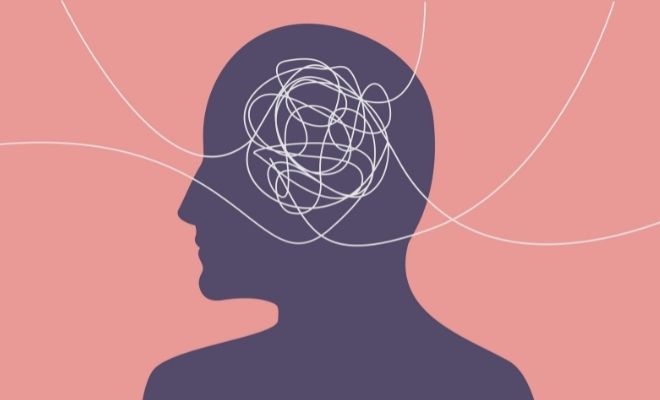Anxiety is a state of hyper activation of the organism that involves both physical and cognitive (psychological) and behavioral symptoms. These symptoms appear at the current moment of suffering from anxiety and also in the short term.

But in the long term, the consequences of anxiety for physical and mental (psychological) health are also many. How does anxiety affect our health? Let’s talk about some of its most important consequences:
Physical consequences of anxiety
On a physical level, anxiety has important implications. Feeling anxiety, especially chronic anxiety, causes us significant physical exhaustion, which translates into physical exhaustion. Thus, when we feel anxious for a long time, we tend to feel tired and fatigued, without energy at all.
This is explained because our mind is investing many resources in: thinking, thinking about things, anticipating the future, worrying… In this way, all the energy, both physical and mental, ends up being allocated to aspects that wear us out physically.
Beyond physical exhaustion, chronic anxiety can also lead to other important physical changes to health, such as:
– Cardiovascular disorders.
– Gastrointestinal disorders.
– Problems or skin reactions.
– Psychosomatic disorders (where no organic/biological factors are identified that explain the symptoms of the ailment in question).
Let’s see some of these physical consequences of anxiety in more detail:
Skin reactions
One of the consequences of anxiety for health, on a physical level, is skin reactions. And it is that our skin manifests many of the alterations that we suffer at a psychological level, such as anxiety or other reactions and emotions (pain, sadness…).
Specifically, anxiety causes us to feel stress, which increases our blood flow. This increase in blood flow favors our face to change color; some people turn pale and others red. Because? Because when our body experiences anxiety, the sympathetic nervous system is activated, which sends more blood than usual to the different muscles of the body?
On the other hand, anxiety could also accelerate premature aging of the skin. We are also more prone to inflammation, since histamine is increased in our body, which is an inflammatory substance. We can also suffer from skin disorders or dermatological disorders, such as: dermatitis, eczema, psoriasis (which was previously had), etc.
Muscle tension
Our muscles also look “sore” when we experience long-term anxiety. In this way, our muscles contract more and more and we develop muscle that can, in turn, cause us physical pain.
Thus, when anxiety is prolonged over time (and sometimes without the need to do so), we can experience muscle pain that arises from that tension and that translates into: migraines, tension headaches, neck pain, stiffness, etc.
Stomach and digestive disorders
Another of the consequences of anxiety for health, on a physical level, is stomach. Thus, we can suffer from stomach ulcers, for example. An ulcer is a deep lesion in the lining of the stomach or duodenum.
Beyond ulcers, we can suffer other digestive problems, as well as alterations in our metabolism. This happens because anxiety ends up causing our body to not regulate digestive processes well and the intestines end up being affected.
On the other hand, due to anxiety, our body is less and less capable of absorbing nutrients well. This causes numerous problems to appear, such as: diarrhea, a feeling of swelling, heartburn, etc. Finally, in more extreme cases, we can lose the ability to control the sphincters.
Psychological consequences of anxiety
Anxiety, especially chronic anxiety, also has important consequences for mental health, that is, psychological, cognitive and behavioral consequences. How does it affect us?
– Avoidance of activities that previously gave us pleasure (for example, in social, avoidance of social situations).
– Stop taking care of yourself.
– Stop carrying out activities necessary for personal, social and work development.
– Mood disturbances and disorders (for example, depression).
– Low self-esteem.
– Learned helplessness.
– Self-injurious behavior or suicidal ideas (in more extreme cases).
– Social isolation or withdrawal.
– Sadness.
As in the case of the physical consequences, we are now going to learn about some of the psychological consequences of anxiety, in more detail:
Sadness or depression
The fact of experiencing anxiety for a long time can lead to the appearance of other types of mental health problems, such as depression. Depression is a multi-causal disorder, that is, there are many factors that contribute to its appearance. However, if these factors are added to a prolonged period of suffering from anxiety, it is easy for the person to.
In fact, in many cases, people who suffer from anxiety also suffer from depressive symptoms, and vice versa. Let’s remember that suffering from anxiety is very exhausting physically and mentally, and places us in a fragile plane in which it is easier for symptoms such as those mentioned to appear.
Sadness is another of the consequences of anxiety for psychological health, which arises for different reasons: for example, because we feel incapable of managing that anxiety, because we are mentally exhausted, because we believe that we do not have the necessary resources to improve our current situation etc.
Forget self-care
At a behavioral level, when we suffer from prolonged anxiety, we can also begin to forget to take care of ourselves. Self-care implies taking care of the habits of daily life: hygiene, food, sleep, time management, rest, sports, etc. That is, it implies investing quality time in oneself.
When you suffer from anxiety, often the anxiety itself drags the person to stop taking care of themselves, because they are too aware of worrying, rumination, etc. This, on an emotional level, is very harmful; remember that when we don’t take care of ourselves, our defenses go down and we are more vulnerable to getting sick, either physically or mentally.
Learned helplessness
Learned helplessness is the perception that we cannot change our current situation; it involves sense, coupled with feelings of hopelessness and helplessness. When we suffer from anxiety, and especially chronic anxiety, we can end up developing learned helplessness.
Learned helplessness is very dangerous, as it places us in a position of passivity, of loss of hope; through it, we not only believe that the situation will not improve, but also that we.
And this can end up leading to other feelings or sensations such as sadness, the feeling of emptiness or anguish. In addition, learned helplessness, as we said, paralyzes us, blocks us, and increases the probability of chronic anxiety (because we do not ask for help or do anything to deal with it).
As we can see, anxiety not only affects us at the present time, but it can have serious consequences for our health in the medium and long term. At a medical level, all our systems can be affected, and that implies an affectation at the dermatological, digestive, cardiac level…
But on a psychological level we can also suffer the consequences of anxiety, and end up developing symptoms of all kinds that can become chronic over time, feeding back precisely that initial anxiety.
If you feel anxiety and, above all, if you have been experiencing it for a long time, we. Anxiety is not something that should scare or worry us, but we do need to deal with it in order to learn to manage it, understand why it is there and what it is trying to tell us.






